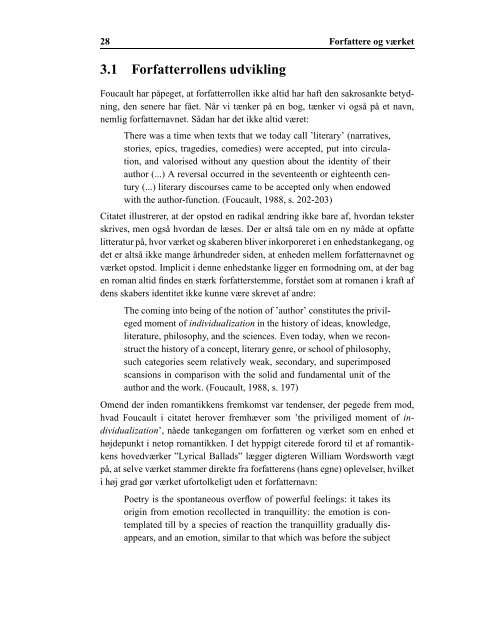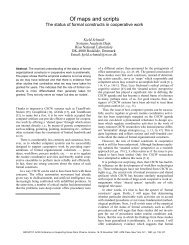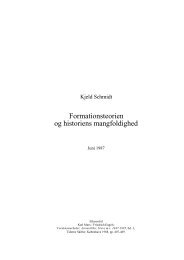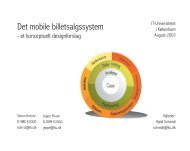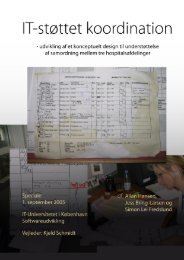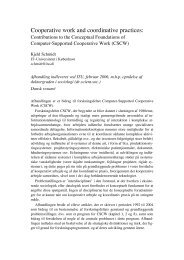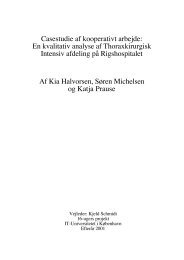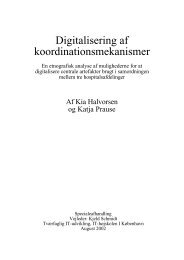Den 3. stemme - en undersøgelse af skønlitterære ... - Kjeld Schmidt
Den 3. stemme - en undersøgelse af skønlitterære ... - Kjeld Schmidt
Den 3. stemme - en undersøgelse af skønlitterære ... - Kjeld Schmidt
Create successful ePaper yourself
Turn your PDF publications into a flip-book with our unique Google optimized e-Paper software.
28 Forfattere og værket<br />
<strong>3.</strong>1 Forfatterroll<strong>en</strong>s udvikling<br />
Foucault har p˚apeget, at forfatterroll<strong>en</strong> ikke altid har h<strong>af</strong>t d<strong>en</strong> sakrosankte betydning,<br />
d<strong>en</strong> s<strong>en</strong>ere har f˚aet. N˚ar vi tænker p˚a <strong>en</strong> bog, tænker vi ogs˚a p˚a et navn,<br />
nemlig forfatternavnet. S˚adan har det ikke altid været:<br />
There was a time wh<strong>en</strong> texts that we today call ’literary’ (narratives,<br />
stories, epics, tragedies, comedies) were accepted, put into circulation,<br />
and valorised without any question about the id<strong>en</strong>tity of their<br />
author (...) A reversal occurred in the sev<strong>en</strong>te<strong>en</strong>th or eighte<strong>en</strong>th c<strong>en</strong>tury<br />
(...) literary discourses came to be accepted only wh<strong>en</strong> <strong>en</strong>dowed<br />
with the author-function. (Foucault, 1988, s. 202-203)<br />
Citatet illustrerer, at der opstod <strong>en</strong> radikal ændring ikke bare <strong>af</strong>, hvordan tekster<br />
skrives, m<strong>en</strong> ogs˚a hvordan de læses. Der er alts˚a tale om <strong>en</strong> ny m˚ade at opfatte<br />
litteratur p˚a, hvor værket og skaber<strong>en</strong> bliver inkorporeret i <strong>en</strong> <strong>en</strong>hedstankegang, og<br />
det er alts˚a ikke mange ˚arhundreder sid<strong>en</strong>, at <strong>en</strong>hed<strong>en</strong> mellem forfatternavnet og<br />
værket opstod. Implicit i d<strong>en</strong>ne <strong>en</strong>hedstanke ligger <strong>en</strong> formodning om, at der bag<br />
<strong>en</strong> roman altid findes <strong>en</strong> stærk forfatter<strong>stemme</strong>, forst˚aet som at roman<strong>en</strong> i kr<strong>af</strong>t <strong>af</strong><br />
d<strong>en</strong>s skabers id<strong>en</strong>titet ikke kunne være skrevet <strong>af</strong> andre:<br />
The coming into being of the notion of ’author’ constitutes the privileged<br />
mom<strong>en</strong>t of individualization in the history of ideas, knowledge,<br />
literature, philosophy, and the sci<strong>en</strong>ces. Ev<strong>en</strong> today, wh<strong>en</strong> we reconstruct<br />
the history of a concept, literary g<strong>en</strong>re, or school of philosophy,<br />
such categories seem relatively weak, secondary, and superimposed<br />
scansions in comparison with the solid and fundam<strong>en</strong>tal unit of the<br />
author and the work. (Foucault, 1988, s. 197)<br />
Om<strong>en</strong>d der ind<strong>en</strong> romantikk<strong>en</strong>s fremkomst var t<strong>en</strong>d<strong>en</strong>ser, der pegede frem mod,<br />
hvad Foucault i citatet herover fremhæver som ’the priviliged mom<strong>en</strong>t of individualization’,<br />
n˚aede tankegang<strong>en</strong> om forfatter<strong>en</strong> og værket som <strong>en</strong> <strong>en</strong>hed et<br />
højdepunkt i netop romantikk<strong>en</strong>. I det hyppigt citerede forord til et <strong>af</strong> romantikk<strong>en</strong>s<br />
hovedværker ”Lyrical Ballads” lægger digter<strong>en</strong> William Wordsworth vægt<br />
p˚a, at selve værket stammer direkte fra forfatter<strong>en</strong>s (hans egne) oplevelser, hvilket<br />
i høj grad gør værket ufortolkeligt ud<strong>en</strong> et forfatternavn:<br />
Poetry is the spontaneous overflow of powerful feelings: it takes its<br />
origin from emotion recollected in tranquillity: the emotion is contemplated<br />
till by a species of reaction the tranquillity gradually disappears,<br />
and an emotion, similar to that which was before the subject


